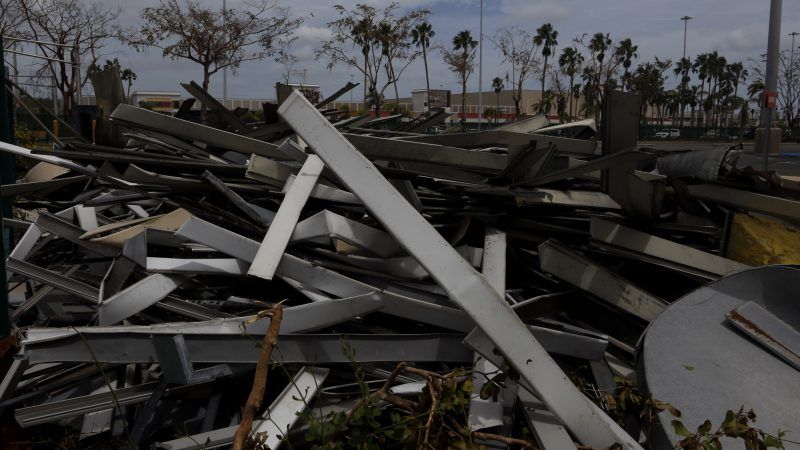As Tropical Storm Barry Approaches, the GAO Highlights FEMA's Past Failings
Unclear and contradictory procedure guidelines slowed down relief efforts in Puerto Rico in 2017. Will it happen again this year? Probably.

As New Orleans braces for Tropical Storm Barry, the Government Accountability Office (GAO) has released a damning report about the feds' performance after hurricanes Irma and Maria struck Puerto Rico and the U.S. Virgin Islands in 2017. The storms left much of Puerto Rico without power for months and claimed around 3,000 lives.
The report lays out several problems with how the Federal Emergency Management Agency (FEMA) performed. One is a basic lack of clarity about how to distribute aid. According to the GAO, municipal officials in both territories—and FEMA officials themselves—found that FEMA's official procedures often came with "missing, incomplete, or inconsistent guidance." These difficulties in communication led to delays in project development and contract negotiations, and delays after disasters can be deadly.
That failure to coordinate was on full display when about a million water bottles were left to spoil on a Puerto Rican airstrip for a year. After the story of the wasted water broke, both FEMA and the local government tried to blame the other—little consolation to the residents of Puerto Rico, who could have used that water after the storms.
Unfortunately, this is nothing new. As Reason has reported many times, FEMA frequently struggles with the administration of aid.
In a 2018 report on its Puerto Rico operations, FEMA acknowledged some of its failings and said it has taken some steps to improve its administration, such providing additional training for employees. The GAO report says that it's too soon to tell if FEMA's adjustments have improved the agency's capacity to act. Maybe FEMA will respond better to Barry than it did to Irma and Maria. But its track record doesn't inspire much confidence—it has displayed slow response times, a lack of preparedness, and billions of dollars in waste after many major natural disasters.
Fortunately, FEMA won't be the only force on the scene. Private groups and decentralized networks have responded effectively to many disasters. One of the most famous is the "Cajun Navy," a group of skilled Louisianan boaters who helped save countless lives in Houston after Hurricane Harvey hit in 2017. Meanwhile, the Waffle House has come to play an important role in storm preparedness, with even government agencies using the so-called "Waffle House Index"—whether or not the restaurant chain's locations have closed—to judge the severity of a storm. Other nongovernmental bodies that have proven effective after disasters range from Walmart to Occupy Wall Street.
Hopefully, FEMA will have improved its capabilities once Tropical Storm Barry arrives. But if it hasn't, others will be there to help.
Editor's Note: As of February 29, 2024, commenting privileges on reason.com posts are limited to Reason Plus subscribers. Past commenters are grandfathered in for a temporary period. Subscribe here to preserve your ability to comment. Your Reason Plus subscription also gives you an ad-free version of reason.com, along with full access to the digital edition and archives of Reason magazine. We request that comments be civil and on-topic. We do not moderate or assume any responsibility for comments, which are owned by the readers who post them. Comments do not represent the views of reason.com or Reason Foundation. We reserve the right to delete any comment and ban commenters for any reason at any time. Comments may only be edited within 5 minutes of posting. Report abuses.
Please to post comments


FEMA usually takes a few years to process their payments. Its a slow moving and inefficient process, but once you realize how many electrical systems get completely destroyed every single year by ice storms, wind storms, flooding, tornado, hurricanes, hail, etc. multiple times a year, causing billions in damage each time, you realize that FEMA was probably set up for a reason.
These systems usually use private lending to bridge the gap between FEMA disaster areas being declared and actually receiving FEMA disbursements for repairs. Think the disasters cause a lot of deaths? A lot more deaths can occur when the lights don't turn on and your heat stops working in the dead of winter in Campbell, SD.
"Why don't they just move?" Because you like your gas prices cheap and you enjoy eating food. You want these people pumping natural gas and planting crops. You want them to have electricity to do so.
dear GAO we can totes sit back and watch government make an ass out of itself every time w/o you ... everyone's fired.
How da fuck does bottled water "spoil"?
I suppose technically, it was the bottles that "spoiled". Something about a year of improper storage and temperature changes and a bunch of stuff best summed up as "Orange man bad". Or maybe it was racism. Could have been sexism. The democrats will do it better; vote for whoever is running.